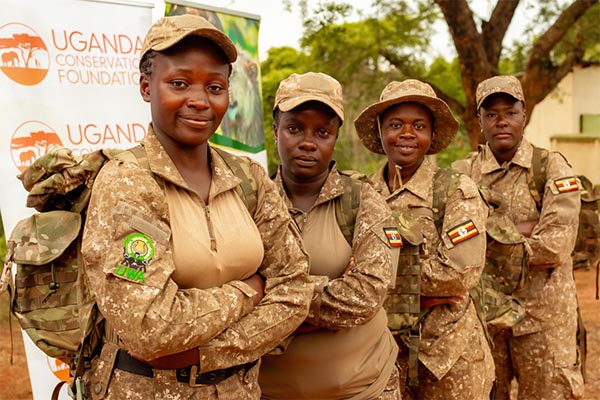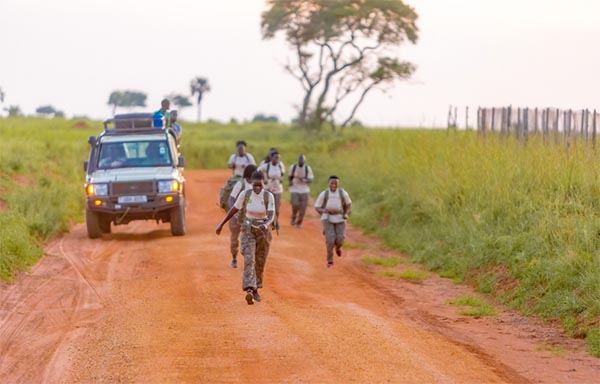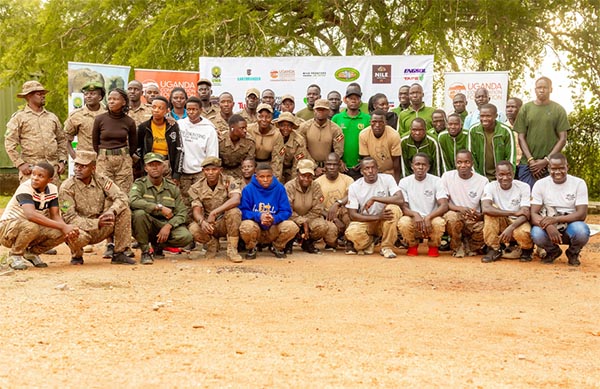
Murchison Falls, Uganda | THE INDEPENDENT | In the heart of Uganda’s Murchison Falls National Park, the sun had barely risen when over 18 teams of wildlife rangers, community scouts, and teams from supporting organizations from across Uganda gathered at the starting line. The air buzzed with anticipation as these guardians of nature prepared to tackle the grueling 21-kilometer half-marathon. The race is designed to mimic the daily rigors of ranger life, with participants carrying 22-kilogram backpacks, simulating the heavy gear they often shoulder on patrols to guard wildlife from poachers.
As some of the participants did last minute stretches on September 21, and tightened their laces, there was a sight not so common at a marathon start line – a weighing scale; the rules required each participant to verify that his previously packed and weighed backpack is 22kg before the race began, and at the finish line.
This wasn’t just any race. It was the 2024 Wildlife Ranger Challenge last month, an event that has quickly become a symbol of dedication and unity in African conservation efforts. Wildlife Ranger Challenge is a global event organized by Tusk and The Game Rangers Association of Africa GRAA, gathering over 150 ranger teams from over 100 protected areas across Africa, and several supporters from across the globe.
As the starting gun fired, teams from Uganda’s largest national parks as well as supporters surged forward, their determination palpable. Among them, the “Kidepo Warriors,” last year’s champions, set a blistering pace. But they weren’t alone in their quest for victory.
The Kidepo Valley National Park team successfully defended their title, crossing the finish line first once again in 2 hrs 28 mins, holding hands as a united force. But hot on their heels was the Kibale National Park team which made an inspiring comeback after finishing near the bottom last year, securing their spot on the podium with a fantastic time of 2h 45m. Just seconds behind them, the hosts, the Murchison Falls National Park team, crossed the line in third place with a strong finish, holding off stiff competition from Ziwa Rhino Sanctuary.
But perhaps the most inspiring sight was the performance of the women’s teams. Competing on the same challenging course as their male counterparts, these female rangers shattered expectations. The Kidepo Valley National Park women’s team set a new benchmark, completing the course in just 2 hours and 58 minutes.



This year’s Wildlife Ranger Challenge attracted significant attention, with notable figures such as Maurice Kirya, the German Ambassador to Uganda, and the Uganda Wildlife Authority’s Communications Manager in attendance. The event, which has been steadily growing in prominence since its inception in 2020, has now expanded to include rangers from over 100 protected areas across more than 20 African countries.
As the last runners crossed the finish line, the atmosphere shifted from intense competition to jubilant celebration. Rangers, exhausted but exhilarated, gathered for a well-deserved brunch, swapping stories of their experiences on the course. The air was filled with laughter and camaraderie as competitors from different parks and organizations mingled, united by their shared passion for conservation.
Following the meal, a series of speeches commenced, with conservation leaders and government officials praising the rangers’ dedication and highlighting the importance of their work. The prize-giving ceremony was a moment of pride for all involved, with trophies and medals gleaming in the midday sun as they were presented to the top performers. The Kidepo Warriors stood tall, their victory a testament to their unwavering commitment to both their training and their daily conservation efforts.
With the formal proceedings concluded, the rangers headed off to refresh themselves, their spirits high despite the physical demands of the day. But their work wasn’t done – a photoshoot in the wild awaited, capturing these conservation heroes in their element. As the afternoon wore on, the scent of a barbecue filled the air, promising a relaxed evening of continued celebration and bonding among these guardians of nature.
What makes this marathon truly unique is its setting in the heart of Murchison Falls National Park. Unlike typical urban races, participants here share the course with the very wildlife they work to protect. Throughout the event, rangers and spectators alike were treated to the sight of antelopes gracefully bounding across the path, and even the occasional elephant lumbering in the distance. Each team was accompanied by a support vehicle manned by fellow rangers, ready to assist not just with race-related needs, but also to ensure the safety of both runners and animals in this extraordinary wilderness marathon.
Since its inception in 2020, the Wildlife Ranger Challenge has raised over $20 million to support ranger welfare and conservation efforts. But beyond the funds, it’s the intangible benefits that truly shine.
“It has been a remarkable way to not only raise funds but also rebuild teamwork, morale, resilience, and endurance among our rangers from various parts of Africa, who are often overlooked. This initiative has uplifted everyone, providing a shared purpose and energy. The rangers unanimously love it, as it connects and unites them”, said Michael Keigwin, Founding Trustee of Uganda Conservation Foundation, the organizer of the Wildlife Ranger Challenge locally. “It’s not just about the race—it’s about rebuilding morale, resilience, and unity among our rangers across Africa.”
For rangers like Amos Amaseku, the watchkeeper at the Joint Operations Command Center, Murchison Falls National Park, the challenge represents more than just a race. “I’ve seen this grow over the past three years, I’ve participated in the last three races and have witnessed a substantial increase in the number of participants” he said.
“It’s not just about the competition—it’s about the support we receive for our daily work, from logistics to supplies. The Wildlife Ranger Challenge has been supportive of our work with logistics, other suppliers, and allowances.” Amaseku went on to say.
Fred Kiiza, Chief Warden of Murchison Conservation Area, noted the tangible impacts: “The support from this initiative has been very helpful, providing crucial resources that enhance our effectiveness in the field. Last year, we received a vehicle that has significantly boosted our operations ”
As the sun set on another successful challenge, the message was clear: Africa’s wildlife rangers are not just protectors of nature—they’re athletes, team players, and conservation heroes, pushing their limits to safeguard the continent’s precious ecosystems. With events like the Wildlife Ranger Challenge shining a spotlight on their crucial work, these dedicated individuals are finally getting the recognition they deserve. And as they continue to face the daily challenges of anti-poaching operations and community engagement, they do so knowing they have the support of a global community behind them.
 The Independent Uganda: You get the Truth we Pay the Price
The Independent Uganda: You get the Truth we Pay the Price





